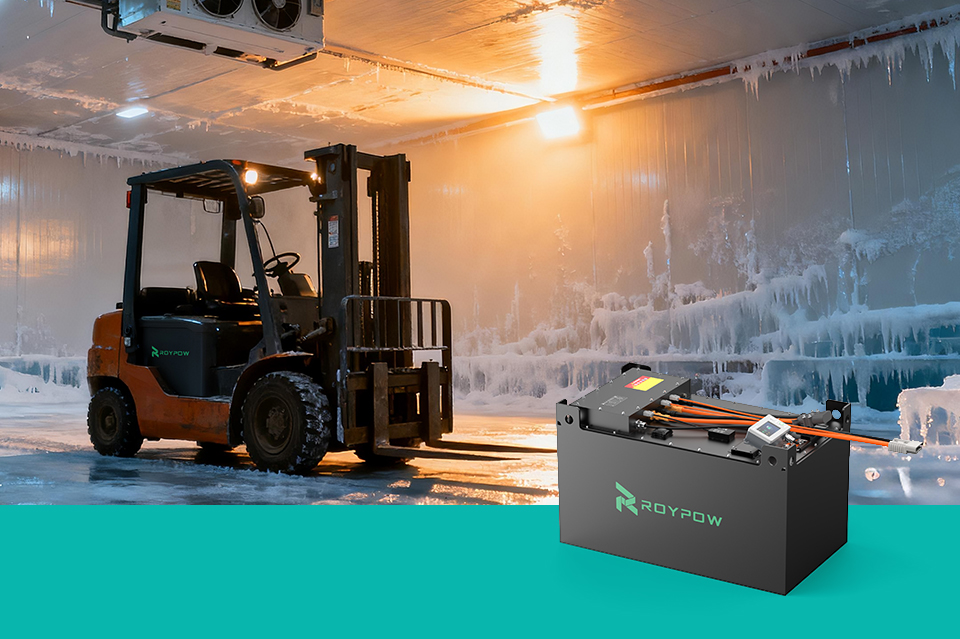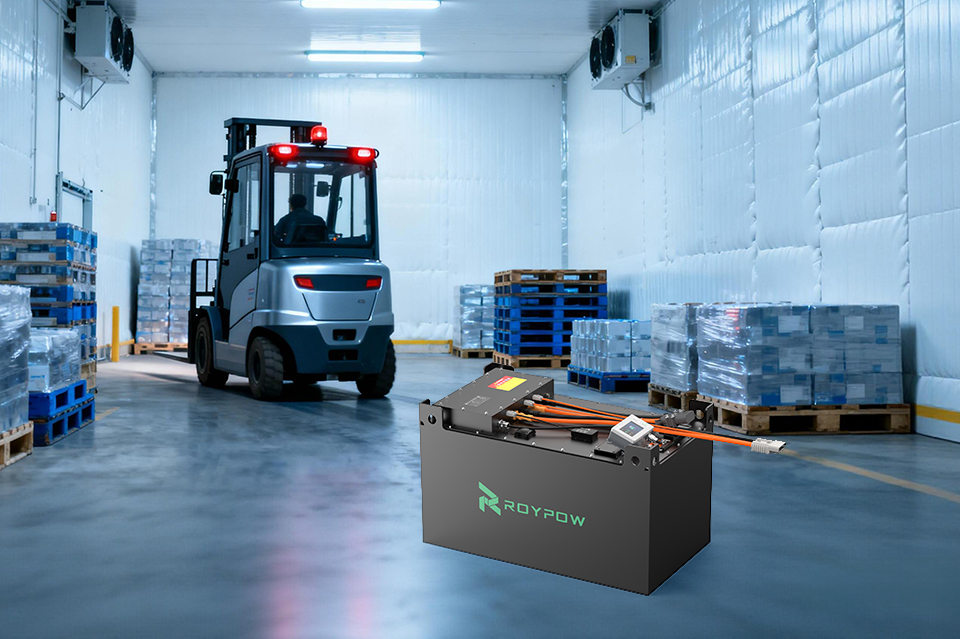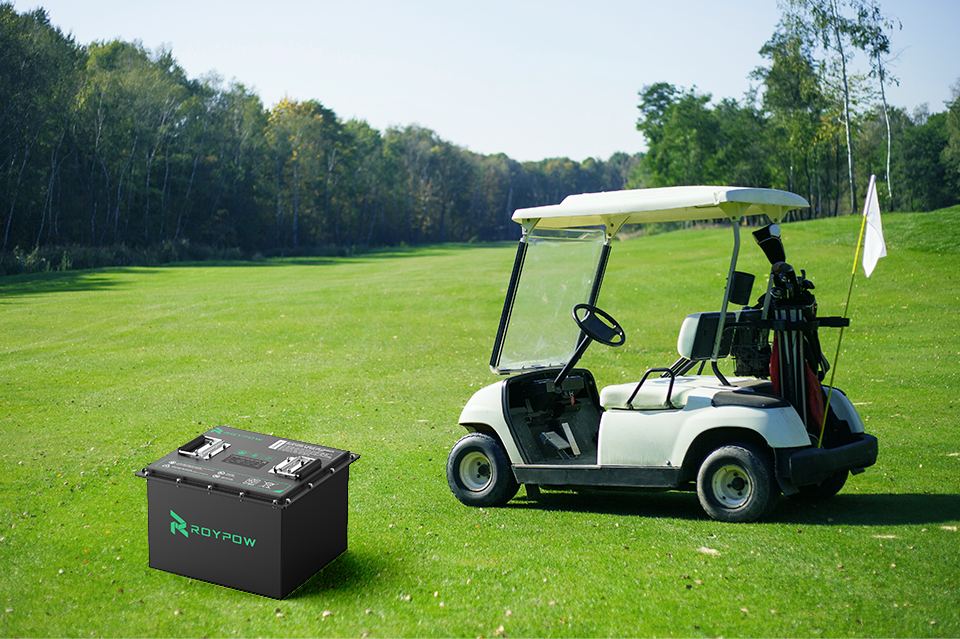Cold chain and logistics are vital for preserving the quality of perishable goods, such as pharmaceuticals and food. Forklifts, as the core material handling equipment, are vital to this operation.
However, the severe performance degradation of traditional power sources, particularly lead-acid batteries, in low-temperature environments has become a major bottleneck, constraining the efficiency, safety, and total cost of ownership of cold chain operations.
As a professional battery manufacturer, we deeply realize these challenges. To address them, we have introduced our newly anti-freeze lithium forklift batteries, which can stably operate in -40°C to -20°C.
Low Temperature Impact on Lead-Acid Batteries
Traditional lead-acid batteries face the following challenges in cold storage environments:
1. Sharp Capacity Decline
- Mechanism: Freezing conditions cause the electrolyte to thicken, slowing ion movement. At the time, the pores in the material contract dramatically, cutting the reaction rate. Consequently, the battery’s usable capacity may fall to 50‑60 % of what it delivers at room temperature, significantly reducing its charge/discharge cycle.
- Impact: Constant battery swaps or mid‑shift charging throws the workflow into disarray, breaking the continuity of operations. Eat away at logistical efficiency.
2. Irreversible Damage
- Mechanism: During charging, more electrical energy turns into heat. This results in poor charge acceptance. If the charger forces current, the hydrogen gas begins to evolve at the terminal. At the moment, the soft lead‑sulfate coating on the negative plates hardens into deposits—a phenomenon known as sulfation, which inflicts permanent damage on the battery.
- Impact: Charging times multiply, electricity costs rise, and battery life shortens dramatically, creating a vicious cycle of “never fully charging, unable to discharge fully.”
3. Accelerated Life Degradation
- Mechanism: Every deep discharge and improper charge in low temperatures physically damages the battery plates. Problems like sulfation and active material shedding are compounded.
- Impact: A lead-acid battery that might last 2 years at room temperature could see its life shortened to less than 1 year in harsh cold storage conditions.
4. Increased Hidden Safety Risks
- Mechanism: Inaccurate capacity readings prevent operators from judging remaining power, easily leading to over-discharge. When a battery is over-discharged below its limit, its internal chemical and physical structure will suffer irreversible damage, such as internal short circuits, bulging, or even thermal runaway.
- Impact: This not only brings about hidden safety hazards for warehouse operations, but also boosts labor costs for maintenance and monitoring.
5. Insufficient Power Output
- Mechanism: Significantly increased internal resistance causes a sharp voltage drop under high current demand (e.g., forklift lifting heavy loads).
- Impact: Forklifts become weak, with slower lifting and travel speeds, directly affecting throughput in critical links like dock loading/unloading and cargo stacking.
6. Increased Maintenance Needs
- Mechanism: Extreme cold accelerates water loss imbalance and uneven cell performance.
- Impact: Lead-acid batteries require more frequent watering, equalization, and inspections, increasing maintenance labor and downtime.
Core Technology of ROYPOW Anti-Freeze Lithium Forklift Batteries
1. Temperature Control Technology
- Pre-heating Function: If the temperature gets too low, the pre-heating permits the battery to charge quickly and safely in cold conditions.
- Insulation Technology: The battery pack uses special insulation material, which functions as a thermal barrier to lower heat loss in cold environments.
2. Durability and Comprehensive Protection
- IP67-Rated Waterproof: Our ROYPOW lithium forklift batteries feature sealed waterproof cable glands, achieving the highest ingress protection rating and delivering ultimate protection against water, ice, and cleaning procedures.
- Built to Stop Condensation: To prevent internal condensation during temperature shifts, this LiFePO4 forklift battery is hermetically sealed, equipped with a water condensation design, and treated with moisture-proof coatings.
3. High-Efficiency Operation
Equipped with a smart 4G module and an advanced BMS, this lithium-ion forklift battery enables remote monitoring, OTA updates, and precise cell balancing to ensure safe, high-performance operation.
4. Extended Lifespan & Zero Maintenance
It boasts a design life of up to 10 years and a cycle life of over 3,500 charges, all without requiring any daily maintenance.
5. Key Performance Validation
To validate the performance of our anti-freeze forklift battery, we conducted the following rigorous test:
Test Subject: 48V/420Ah Cold Storage Special Lithium Battery
Test Environment: -30°C constant temperature environment
Test Conditions: Continuous discharge at 0.5C rate (i.e., 210A current) until device shutdown.
Test Results:
- Discharge Duration: Lasted 2 hours, fully meeting the theoretical discharge capacity (420Ah ÷ 210A = 2h).
- Capacity Performance: No measurable decay; discharged capacity was consistent with room temperature performance.
- Internal Inspection: Immediately after discharge, the pack was opened. The internal structure was dry, with no traces of condensation found on key circuit boards or cell surfaces.
The test results confirm stable battery operation and excellent capacity retention across a wide temperature range, from -40°C to -20°C.
Application Scenarios
Food Industry
Stable battery runtime ensures rapid loading and unloading of perishable goods like meat, aquatic products, fruits, vegetables, and dairy. This minimizes the risk of temperature rise for goods in transition zones.
Pharmaceutical & Chemical Industries
For pharmaceuticals and vaccines, even brief temperature fluctuations can affect product efficacy. Our anti-freeze lithium forklift batteries support quick and reliable transfer for these temperature-sensitive goods. This consistent reliability is crucial, ensuring product integrity and compliance with storage regulations.
Cold Chain Warehousing & Logistics
In time-sensitive cold chain hubs, our batteries supply uninterrupted power for intensive tasks like order picking, cross-docking, and rapid loading of outbound trucks. This eliminates delays caused by battery failure.
Scientific Usage and Maintenance Guidelines
Pre-conditioning Transition: Although our lithium forklift battery has a pre-heating function, operationally, it is recommended to move the battery from the freezer to a 15-30°C transition area for natural warming or charging. This is a good practice for extending the life of all electronic components.
Regular Inspection: Even with zero maintenance, a quarterly visual inspection is recommended to check plugs and cables for physical damage, and to read the battery health report via the BMS data interface.
Long-Term Storage: If the battery will be unused for over 3 months, charge it to 50%-60% (the BMS often has a storage mode) and store it in a dry, room-temperature environment. Perform a full charge-discharge cycle every 3-6 months to wake up and calibrate the BMS’s SOC calculation and maintain cell activity.
Eliminate Battery Anxiety from Your Cold Chain with ROYPOW
Based on the comprehensive analysis above, it is clear that traditional lead-acid batteries are fundamentally incompatible with the demanding requirements of cold chain logistics.
By integrating intelligent pre-heating, robust IP67 protection, hermetic anti-condensation design, and smart BMS management, our ROYPOW Anti-Freeze Lithium Forklift Battery delivers stable power, unwavering reliability, and superior economics even in temperatures as low as -40°C. Contact us today to schedule a free consultation.
























